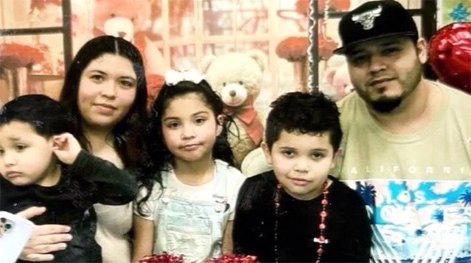|
Suspected
members
of
Venezuela's
Tren de
Aragua
and Mara
Salvatrucha-13
gang,
who were
deported
to El
Salvador
by the
U.S. in
San
Salvador,
are
checked
by
authorities
before
being
sent to
the
country's
infamous
mega-prison
at CECOP
facility
prison.
Photo:
El
Salvador
Press
Presidency
Office/Anadolu
via
Getty
Image |
|
|
|
|
|
 |
 |
 |
|
|
|
|
|
|
 |
|
|
In court
filings,
Abrego
Garcia
testified
he came
to the
United
States
because
the
Barrio
18 gang,
which is
rivals
with
MS-13,
was
extorting
and
threatening
him and
his
family
for
their
pupusa
business
in their
San
Salvador
neighborhood
and
pressuring
him to
join the
gang.
The
family
fled the
neighborhood.
Eventually,
when he
was a
teenager,
Abrego
Garcia’s
parents
sent him
to the
United
States.
(Family
Photo) |
| |
Maryland
Senator
meets
with
deported
man in
El
Salvador
amid
immigration
policy
controversy
Elías
Camhaji
- Latin
America
Reporter
Tell Us
Worldwide
News
TECOLUCA,
EL
SALVADOR
-
Maryland
Senator
Chris
Van
Hollen,
a
Democrat
and
member
of the
Senate
Foreign
Relations
Committee,
met with
Kilmar
Armando
Abrego
Garcia
in San
Salvador.
Mr.
Abrego
Garcia,
a
Maryland
resident,
was
wrongfully
deported
to El
Salvador
in
March,
igniting
a heated
debate
about
U.S.
immigration
policies
and
creating
tension
between
the
Trump
administration
and the
judiciary.
Earlier
in the
day,
Senator
Van
Hollen
attempted
to visit
the
prison
where
Mr.
Abrego
Garcia
had been
detained
for over
a month
but was
denied
entry by
armed
military
officials.
Despite
this,
the
senator
later
met with
Mr.
Abrego
Garcia
at a
hotel in
the
capital.
In
photos
shared
by
Senator
Van
Hollen’s
office,
the two
men are
shown
having a
discussion,
with Mr.
Abrego
Garcia
dressed
in
plainclothes.
The
wrongful
deportation
has
drawn
attention
to the
legal
and
ethical
challenges
in U.S.
immigration
enforcement.
Meanwhile,
El
Salvador’s
President,
Nayib
Bukele,
announced
on
social
media
that Mr.
Abrego
Garcia
would
remain
in
custody
in the
country.
The
situation
underscores
ongoing
tensions
between
national
governments
and
highlights
the
human
cost of
immigration
policy
disputes.
What led
to Mr.
Abrego
Garcia's
wrongful
deportation?
Kilmar
Armando
Abrego
Garcia's
wrongful
deportation
stemmed
from a
series
of
errors
and
controversial
decisions.
Despite
a 2019
court
order
protecting
him from
deportation
due to
fears of
persecution
in El
Salvador,
he was
deported
in March
2025.
The
Trump
administration
claimed
he was
affiliated
with the
MS-13
gang,
based on
allegations
from a
confidential
informant.
However,
Mr.
Abrego
Garcia
and his
legal
team
have
consistently
denied
these
claims,
pointing
out that
he has
no
criminal
record
and has
never
lived in
areas
linked
to the
gang.
The
deportation
occurred
as part
of a
broader
immigration
crackdown,
during
which
individuals
accused
of gang
affiliations
were
sent to
El
Salvador's
CECOT
mega-prison.
Officials
later
admitted
that Mr.
Abrego
Garcia's
deportation
was an
"administrative
error,"
but his
protected
legal
status
had
already
been
rescinded
based on
the
disputed
gang
allegations.
This
case has
highlighted
significant
flaws in
the
immigration
system,
including
reliance
on
questionable
evidence
and the
human
cost of
policy
enforcement.
|
|
|
|
|
|
|
|
|